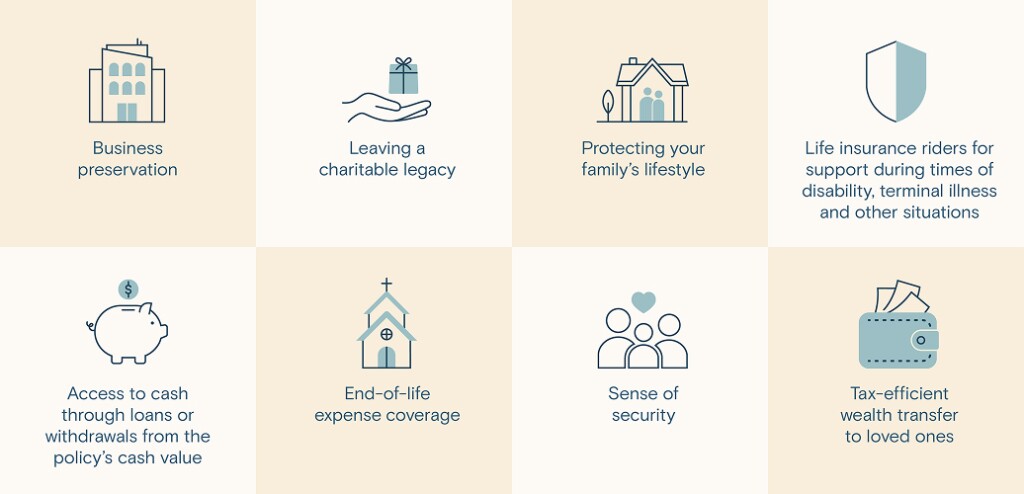Buying life insurance is an important step for you and your loved ones. It's a way to help protect them financially when you're gone. To lay the groundwork for that goal, you've researched the options, picked a carrier and decided on coverage. Now you're ready to dive into how to apply for life insurance.
While the application itself can be straightforward, it needs a lot of information. It helps to prepare ahead of time for a smoother application process. Here's what to expect.
Understanding the life insurance application process
When you apply for
Once the insurer has all this information, your application goes through the
What the insurer will need to know
Life insurance is all about risk. A significant part of the application process involves helping the insurer determine the likelihood of you passing away while covered by the contract. You may need to provide this information to help the insurer make that decision:
- Personal and workplace details
- Your medical history
- Your family's medical history
- Your lifestyle and hobbies
- Your beneficiary, premium payment cycle and other financial information
The medical side of a life insurance application
As you learn how to apply for life insurance, you'll see that your medical history makes up most of your application. Be prepared to share this type of information:
Your medical history
Insurers require a thorough overview of your medical history. Although you may have provided some general information while searching for quotes, the application will be more specific. Many insurers also ask for the contact information of your primary care physician and any specialists for confirmation and additional details on your medical history.
For most insurers, you'll need to provide specifics regarding the diagnosis, symptoms, treatment, medications, and other details about various diseases or disorders of the following: :
- Heart and Circulatory System (hypertension, stroke, heart disease, high cholesterol
- Urinary System (kidney, bladder, prostate)
- Lymphatic System (cysts, tumors, cancer)
- Blood and Immune System (anemia, leukemia, blood clots)
- Endocrine/Hormone System (diabetes, elevated blood sugar, thyroid issues)
- Respiratory System (COPD, asthma, sleep apnea, emphysema)
- Mental/Nervous System (anxiety, depression, ADD, multiple sclerosis)
- Digestive System (ulcers, colitis, liver, stomach, intestines)
- Muscles/Skin/Joint (arthritis, back pain, fibromyalgia)
- Eyes/Ears/Nose/Throat (cataracts, glaucoma, vertigo)
- Reproductive System (ovarian cysts, breast cyst)
- HIV
Your medications & drug use
You'll be asked to report any medications you take currently. You'll need to provide the name of the drug, dosage and frequency. The bottle or packet should have the information you need.
Insurers also ask about any drug or alcohol use, both past and present, and if any treatment has been sought.
Your family's medical history
Some insurers may ask you for medical information about your family, including your parents and siblings. This is to help determine any diseases or conditions common to your family. They can look for a history of cancer, diabetes, heart disease, stroke and other conditions in family members, when they were diagnosed, if they have passed away, and at what age.
Your lifestyle
Insurance companies want an overview of your health, lifestyle and behaviors. Insurers generally review your driving record and want to know if you participate in high-risk hobbies or activities.
For example, if you have a history of speeding tickets or driving under the influence, you may not get coverage or could have to pay a higher premium. The same applies if you enjoy riskier hobbies like motorcycle riding, skydiving or scuba diving.
An in-person medical exam (Paramedical Exam)
You may be asked to complete an in-person medical exam. Even when some types of coverage don't require them, the insurer will still ask about your medical history—and honesty is essential.
If you do need to undergo a medical exam, your insurer will cover the cost and provide a paramedical professional to conduct it. This professional may be able to come to your home or office to complete the exam, which normally takes about 30 minutes.
The following may be completed during a paramedical exam:
- Asking the medical and lifestyle questions from above.
- Measure your height and weight
- Check your heartbeat and blood pressure
- Take blood and urine samples
You may have to go through a more in-depth exam, which could include a stress test or an EKG. These are not required very often but can be asked for if you're older or want a larger death benefit.
The non-medical side of a life insurance application
While your medical history and lifestyle compose most of the details you'll have to provide, insurers also ask some other questions about coverage.
They'll want you to list
You also may need to pick a payment cycle for your premiums. These can range from a one-time lump sum to monthly payment options. Check with your insurer to determine available billing cycles and their potential fees.
Some insurers may ask about your finances and if you have any other life insurance coverage. It's common for people to have more than one contract, such as one at work and one for personal coverage. However, insurers also look to see if you're applying for an appropriate amount of insurance.
What happens after you submit your application
The entire life insurance application process on average takes 3 weeks —from gathering the necessary information, scheduling an exam (if necessary) and completing the underwriting process. Depending on your health history, it could take as little as 1-2 days, or as long as 1-2 months for more extensive health histories where the insurer would need to order your medical records.
If approved, you'll receive notice from your insurer, along with the death benefit amount, the contract start date and your first premium's due date.
What if your life insurance application is inaccurate?
An accurate picture of your health, medical history and lifestyle helps you get the right coverage for your needs. Your life insurance application is a legal document; you'll sign it and authorize your insurer to pull data for verification.
Insurers are meticulous about checking application details. Honest mistakes and errors happen. But if you purposely mislead the insurer on your application, they may deny you coverage or cancel your contract.
Life insurance coverage has a contestability period, lasting two years from the beginning of your contract. If you die within the contestability period, the insurer may review your application in-depth. If they find inaccuracies, they could deny your claim, meaning your beneficiaries won't receive the death benefit.
What happens if the insurer denies coverage?
If you're denied coverage, you still have options. Review your application and look into other insurers. Just because one has rejected your application doesn't mean all of them will. No-exam coverage is another possibility. You could also consider coverage through your employer, if they offer it.
Typically, healthier people get better premium rates. So, if you have a current contract and improve your overall health, ask for a re-evaluation. You may see a lower premium.
Picking the right life insurance coverage
To ensure your family is provided for after you're gone, you'll want to land on the right balance of life insurance payout, premium amount, and additional benefits that can cover you in exceptional situations.
If you have questions about your life insurance application, your coverage options and what to look for in an insurance company, a







